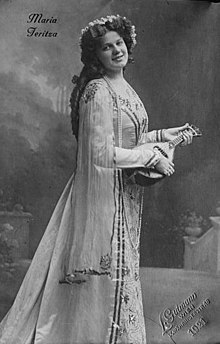Marie Jeritza
| Maria Jeritza | |
|---|---|

Maria Jeritza
|
|
| Born |
Marie Jedličková 6 October 1887 Brno, Austro-Hungarian Empire (now the Czech Republic) |
| Died | 10 July 1982 (aged 94) Orange, New Jersey, United States |
| Nationality | Czech |
| Occupation | Operatic soprano |
Maria Jeritza (6 October 1887 – 10 July 1982) was a celebrated Czech soprano singer, long associated with the Vienna State Opera (1912–1935) and the Metropolitan Opera (1921–1932 and 1951). Her sensational rise to fame and spectacular beauty and personality earned her the nickname "The Moravian Thunderbolt".
Jeritza was born in Brno in 1887 as Mitzi Jedlicka or Marie Jedličková. In 1910, she made her debut as Elsa, in Wagner's Lohengrin, at Olomouc. The Emperor Franz Josef heard her and immediately ordered that she be offered a contract at the Imperial Hofoper, Vienna. She created the roles of Blanchefleur in Kienzl's opera Der Kuhreigen (1911), Ariadne in Strauss's Ariadne auf Naxos (1912), the Empress in his Die Frau ohne Schatten (1919), and Hariette/Juliette in Korngold's Die tote Stadt (Hamburg, 1920), though later became famous for her leading role of Marietta/Marie in the same opera in its January 1921 Vienna premiere, which was also the role in which she debuted at the Metropolitan Opera on 19 November 1921.
On 16 November 1926, she starred in the title role of Puccini's Turandot in its North American premiere at the Metropolitan, where she also created the title or leading soprano roles in Janáček's Jenůfa (1924), Wolf-Ferrari's I gioielli della Madonna (1925), Korngold's Violanta (1927), Richard Strauss's Die Ägyptische Helena (1928), and Suppé's Boccaccio (1931) and Donna Juanita (1932). She was as popular at the Metropolitan as in Vienna, especially as Tosca, Carmen and Massenet's Thaïs. She appeared in an early sound film Grossfürstin Alexandra for which Franz Lehár wrote the song 'Du und ich sind für einander bestimmt'.
...
Wikipedia
